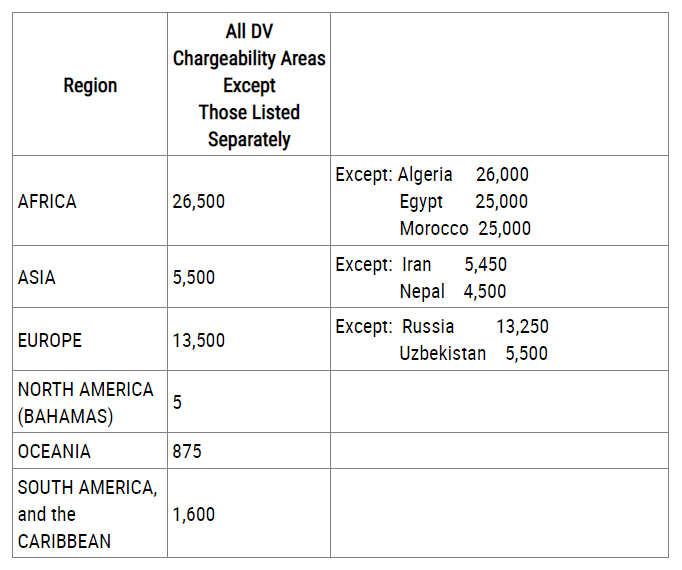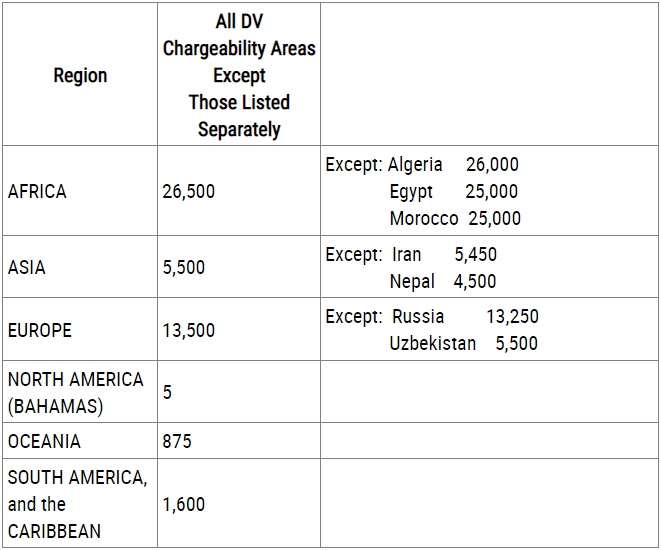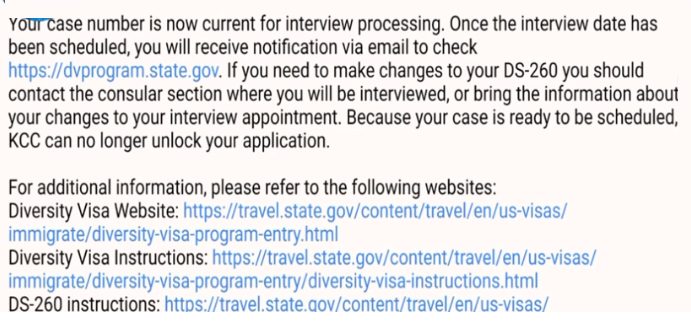FEBRUARY 2024 Cut-Off Numbers for DV-2024: As we saw in the last guide, the Diversity Visa Bulletin for the month of January 2024 showing the cut-off numbers to apply across all regions and exception countries in the DV-2024 Program has been released.
In this guide, we are going to learn the various case number ranges that are concerned by interviews to be conducted during the month of February 2024, as part of the DV-2024 Program.
Diversity Visa Case Numbers Concerned
With the publication of the Visa Bulletin for January 2024, cases whose case numbers are eligible for interview during the month of February 2024 in the various regions and exception countries, excluding those whose interviews have already been scheduled are as follows:
Looking at the Diversity Visa Advanced Notification section of the Visa Bulletin below, as we consider the relevant case number ranges.
From the above image, these are the cut-off numbers to apply across the various regions and exception countries during the month of February 2024, as part of the DV-2024 Program.
Based on these cut-off numbers, the case numbers that are concerned by interviews to be conducted during that same month of February 2024 are as follows.
- South America Region
From the bottom of the table above, in the South America region, case numbers that are concerned by February 2024 interviews are case numbers from case number 1 to case number 1,599, which have so far not received their interview notification.
- Oceania Region
For Oceania region, the numbers go from case number 1 to case number 874, applicants with case numbers in that range who have so far not received their interview notification from the Oceania region are concerned by interviews to be conducted during the month of February 2024.
- North America (Bahamas) Region
In the case of the North America region, the first 4 case numbers that are concerned by interviews being conducted during this month of December 2023, as well as the month of January 2024, are the same 4 case numbers that are concerned by interviews to be conducted during the month of February 2024.
- Europe Region
For Europe region, the numbers go from case number 1 to case number 13,499. Applicants that are chargeable to countries from the Europe region with the exception of the two exception countries having case numbers in this range and who have so far not received their interview notifications are concerned by interviews to be conducted during the month of February 2024.
In the case of the two exception countries, applicants chargeable to Russia with case numbers going from case number 1 to case number 13,249, who have so far not received their interview notification are concerned by interviews to be conducted during the month of February 2024.
In the case of Uzbekistan, the numbers are case number 1 to case number 5,499. Applicants chargeable to Uzbekistan with case numbers in this range who have so far not received their interview notification are concerned by interviews to be conducted during the month of February 2024.
- Asia Region
For Asia region, the case numbers that are concerned by interviews to be conducted during the month of February 2024 are the same case numbers that are concerned by interviews to be conducted during the month of January 2024.
The numbers go from case number 1 to case number 5,499, and that concerns applicants chargeable to countries in the Asia region that are neither of the exception countries.
In the case of Iran, the first exception country, the numbers go from case number 1 to case number 5,449. Applicants chargeable to Iran who have so far not received their interview notification and whose case numbers fall within this range are concerned by interviews to be conducted during the month of February 2024.
In the case of Nepal, the numbers go from case number 1 to case number 4,499. Applicants within this range who have so far not received their interview notification and whose case numbers fall within this range are concerned by interviews to be conducted during the month of February, 2024.
- Africa Region
For Africa region where if you are an applicant who’s not chargeable to Algeria, Egypt or Morocco and you have a case number from case number 1 to case number 26,499 and so far you have not received your interview notification, then you are concerned by interviews to be conducted during the month of February 2024.
In the case of Algeria, the numbers go from case number 1 to case number 25,999. In case you are chargeable to Algeria with a case number within that range, and so far you have not received your interview notification, then you are concerned by interviews to be conducted during the month of February, 2024.
In the case of both Egypt and Morocco, the numbers go from case number 1 to case number 24,999. Applicants chargeable to both of those countries with case numbers within that range who have so far not received their interview notification are concerned by interviews to be conducted during the month of February 2024, as part of the DV-2024 Program.
Those are the case number ranges from the various regions and exception countries that are concerned by interviews to be conducted during the month of February 2024 as part of the DV-2024 Program.
In Conclusion
Cases whose case numbers are the same or higher than their regional or country cut-off are still not current or eligible for interview. Such cases cannot expect to receive their interview notification yet. Applicants concerned must check the Visa Bulletin when it is published in January 2024, to ascertain the status of their case number by then.
The Visa Bulletin is published every month, and it is by means of this tool that Diversity Visa applicants get to know the month when their case will be eligible for interview. Publication of the next Visa Bulletin, i.e the sixth showing cut-offs for the DV-2024 Program will be done some time in January 2024.
For more information concerning what the Visa Bulletin is all about, look at the bottom of this article.
READ: ALL VISA BULLETIN UPDATES
DISCLAIMER: This post and content is designed for general information only and is NOT legal advice. This site is not offering any Diversity Visa and is not the official site for DV Lottery program. The information presented in this post should not be construed to be formal legal advice.
 Jobsscholar Jobs Search | Education Hub | Scholars Portal
Jobsscholar Jobs Search | Education Hub | Scholars Portal



